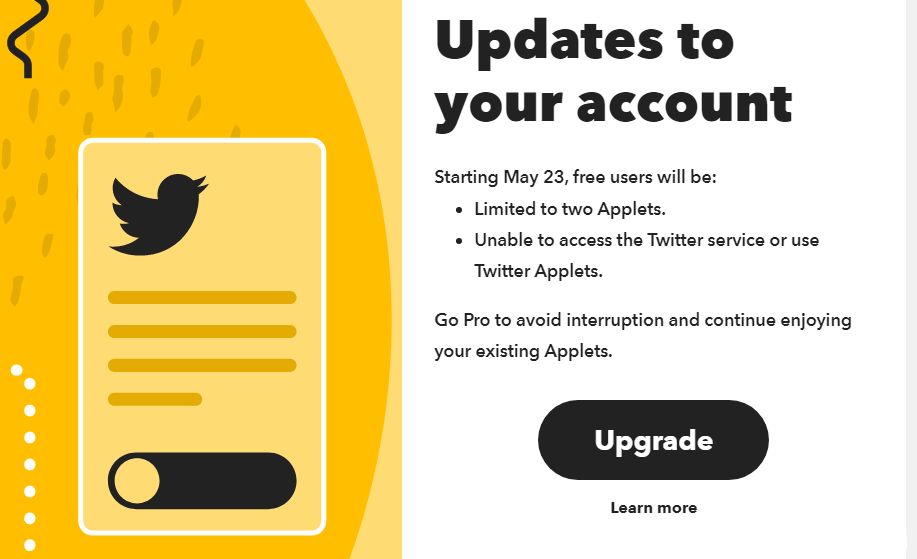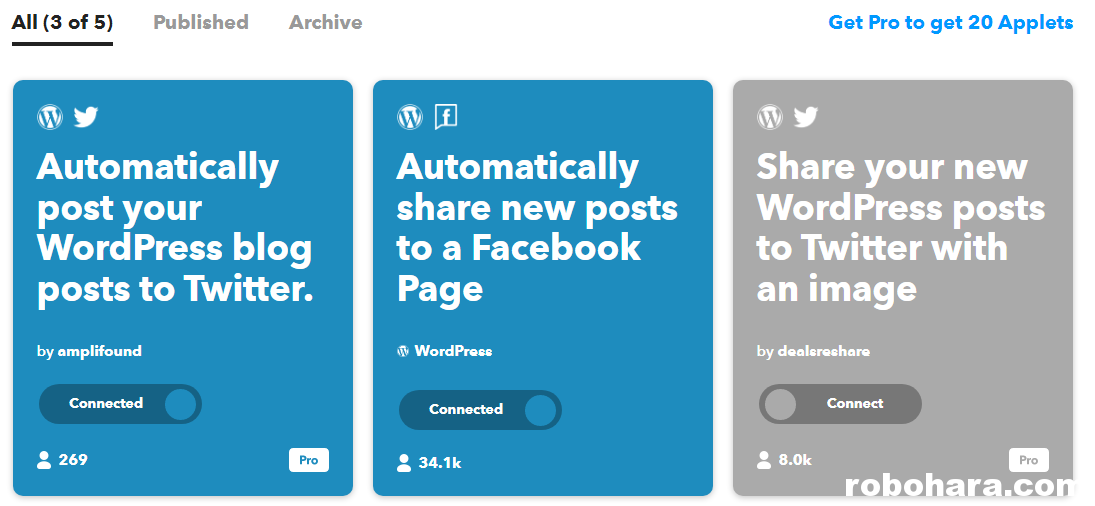
Today, the website known as IFTTT (aka “If This Then That”) announced they will be greatly reducing functionality for free users (including the removal of access to all Twitter applets) at the end of the month. IFTTT currently has approximately 20 million users. I am one of them.
As a kid, home automation seemed very futuristic. I always thought it would be cool if lights automatically turned on when I entered a room, or the stereo in my car automatically changed to my favorite radio station when I started the car. Those are examples of “if this, then that.” If I walk into the living room, then turn on the lights. This is what the IFTTT website does, except for websites and applications — it allows you to create causal relationships between two things that don’t normally talk to each other.
IFTTT has thousands of pre-designed “recipes” (also referred to as Applets) to choose from, or users can create their own. I understand not everyone might not have a use for this service, but for those of us who do, it can be quite the timesaver. For example, when I post a new podcast on podcast.RobOHara.com, announcements are made on Facebook and Twitter. Those automated notifications are posted by IFTTT. Without it, I would have to manually make those announcements every single time I posted a blog entry or released a podcast.
Many of the things IFTTT does can be performed using alternate methods. I used to make automated posts on Facebook and Twitter using WordPress plug-ins, for example. Unfortunately, those plug-ins are frequently abandoned and stop working. Jetpack, another popular WordPress solution, limits free accounts to 30 notifications a month. If you’re posting announcements to both Facebook and Twitter that covers 15 posts a month, and between this blog (RobOHara.com), Podcast.RobOHara.com, and BigRobsVan.com, I exceed that number every month. IFTTT had no such limitations or restrictions. It was convenient to have all of my “Applets” in one place. And… it just worked.
If you’re wondering how IFTTT can offer this service for free to 20 million people… well, I sometimes wondered that, too. 20 million people using a dozen or so Applets sounds like a lot of web traffic and processing cycles.
Well, the party’s over.

I seem to recall in the early days, IFTTT had no limit to the number of Applets you could enable. A year ago when I went to reconfigure some of my Applets, I noticed that free accounts had been restricted to five Applets. Five was workable. Starting next week, free accounts will be limited to two Applets, and two is not enough.
Compounding the issue is Elon Musk’s desperate attempt to make Twitter profitable. One way he has decided to do this is by charging companies to access Twitter’s API. It used to be free for companies to send tweets directly to Twitter. Now, it costs money — big money. Twitter has started charging companies $42,000 a month for this right. We all know things roll downhill, and if Twitter’s going to charge companies to access its API, those companies are going to charge us.
To continue using IFTTT in its current form I’ll need to pony up $30/year — not a lot in the big picture of things, but more than “free” and enough to make me consider whether posting those announcements manually to save a few bucks a month is worth it.
When I was a kid dreaming about lights that would turn themselves on, I never considered the fact that I might have to pay monthly for it.

Between this and the difficulty of automating anything posting to Twitter, it’s rough to keep up everywhere.
Just exit Twitter and be done :-)